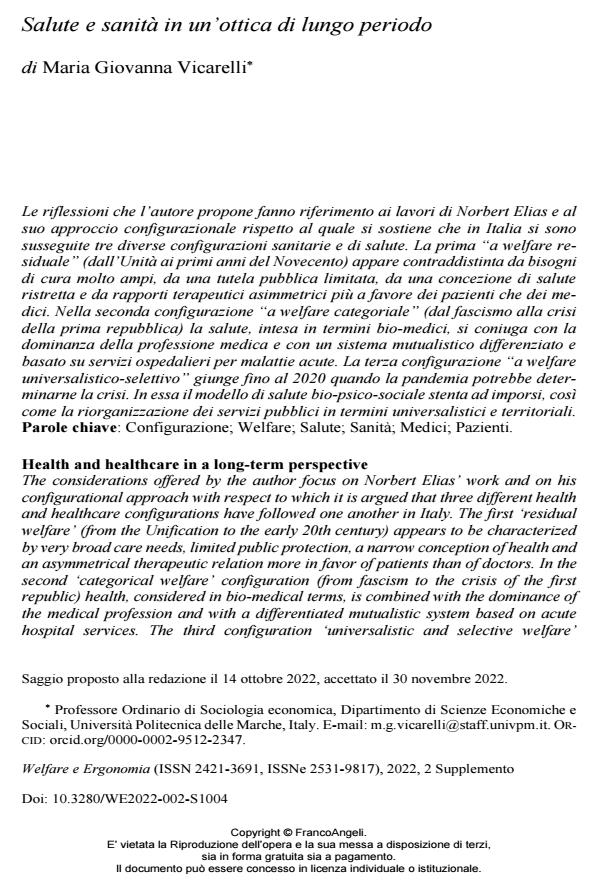Health and healthcare in a long-term perspective
Journal title WELFARE E ERGONOMIA
Author/s Maria Giovanna Vicarelli
Publishing Year 2023 Issue 2022/2 Suppl.
Language Italian Pages 11 P. 31-41 File size 234 KB
DOI 10.3280/WE2022-002-S1004
DOI is like a bar code for intellectual property: to have more infomation
click here
Below, you can see the article first page
If you want to buy this article in PDF format, you can do it, following the instructions to buy download credits

FrancoAngeli is member of Publishers International Linking Association, Inc (PILA), a not-for-profit association which run the CrossRef service enabling links to and from online scholarly content.
The considerations offered by the author focus on Norbert Elias’ work and on his configurational approach with respect to which it is argued that three different health and healthcare configurations have followed one another in Italy. The first ‘residual welfare’ (from the Unification to the early 20th century) appears to be characterized by very broad care needs, limited public protection, a narrow conception of health and an asymmetrical therapeutic relation more in favor of patients than of doctors. In the second ‘categorical welfare’ configuration (from fascism to the crisis of the first republic) health, considered in bio-medical terms, is combined with the dominance of the medical profession and with a differentiated mutualistic system based on acute hospital services. The third configuration ‘universalistic and selective welfare’ reaches the year 2020 when the pandemic could lead to a crisis. Here, the bio-psycho-social health model struggles to impose itself, as does the reorganization of public services in universalistic and territorial terms.
Keywords: Configuration; Welfare; Health; Healthcare; Doctors; Patients.
- Bronzini M., a cura di (2016). Vissuti di malattia e percorsi di cura. Bologna: il Mulino.
- Cosmacini G. (2000). Il mestiere di medico. Storia di una professione. Milano: Raffaello Cortina Editore.
- Elias N. (1990). La società degli individui. Bologna: il Mulino.
- Giarelli G. (2005). La svolta narrativa: l’incontro clinico come negoziazione di significati. In: Giarelli G., Good B.J., Del Vecchio Good M.J., Martini M. e Ruozi C., a cura di, Storie di cura. Medicina narrativa e medicina delle evidenze: l’integrazione possibile. Milano: FrancoAngeli.
- Giorgi C. e Pavan I. (2021). Storia dello Stato sociale in Italia. Bologna: il Mulino.
- Huber M. (2010). Invitational Conference ‘Is health a state or an ability? Towards a dynamic concept of health’. Report of the meeting December 10-11, 2009, The Netherlands Organisation for Health Research and Development and the Health Council of the Netherlands, The Hague.
- Ingrosso M. (2016). La cura complessa e collaborativa. Ricerche e proposte di Sociologia della cura. Roma: Aracne.
- Malatesta M. (2006). Professionisti e gentiluomini. Storia delle professioni nell’Europa contemporanea. Torino: Einaudi.
- Perulli A. (2013). Norbert Elias. Processi e parole della sociologia. Roma: Carocci Editore.
- Taroni F. (2009). Politiche sanitarie in Italia. Il futuro del SSN in una prospettiva storica. Roma: Il Pensiero Scientifico Editore.
- Tousijn W. (2000). Il sistema delle occupazioni sanitarie. Bologna: il Mulino.
- Vicarelli G. (2022). La flessibilità del lavoro nel Servizio Sanitario Nazionale prima e durante la pandemia da Covid-19. Sociologia Del Lavoro, 162: 7-29. DOI: 10.3280/SL2022-162001
- Vicarelli G., a cura di (2001). Eliot Freidson, La dominanza medica. Le basi sociali della malattia e delle istituzioni sanitarie. Milano: FrancoAngeli.
- Vicarelli G. (2019). The creation of the NHS in Italy (1961-1978). Dynamis, 39(1): 21-43.
- Vicarelli G. (2008). Donne di medicina. Bologna: il Mulino.
- Vicarelli G. (1997). Alle radici della politica sanitaria in Italia. Società e salute da Crispi al Fascismo. Bologna: il Mulino.
- Vicarelli G. e Giarelli G. (2022). Tackling the Covid-19 pandemic. The Italian national health service in a comparative perspective. Rassegna Italiana di Sociologia, 3: 555-584. DOI: 10.1423/103688
- Vicarelli G. e Pavolini E. (2013). «Una danza generativa»: lo studio della sanità in Italia tra management, professioni e politiche. Rivista delle Politiche Sociali, 4(suppl.): 187-209.
Maria Giovanna Vicarelli, Salute e sanità in un’ottica di lungo periodo in "WELFARE E ERGONOMIA" 2 Suppl./2022, pp 31-41, DOI: 10.3280/WE2022-002-S1004